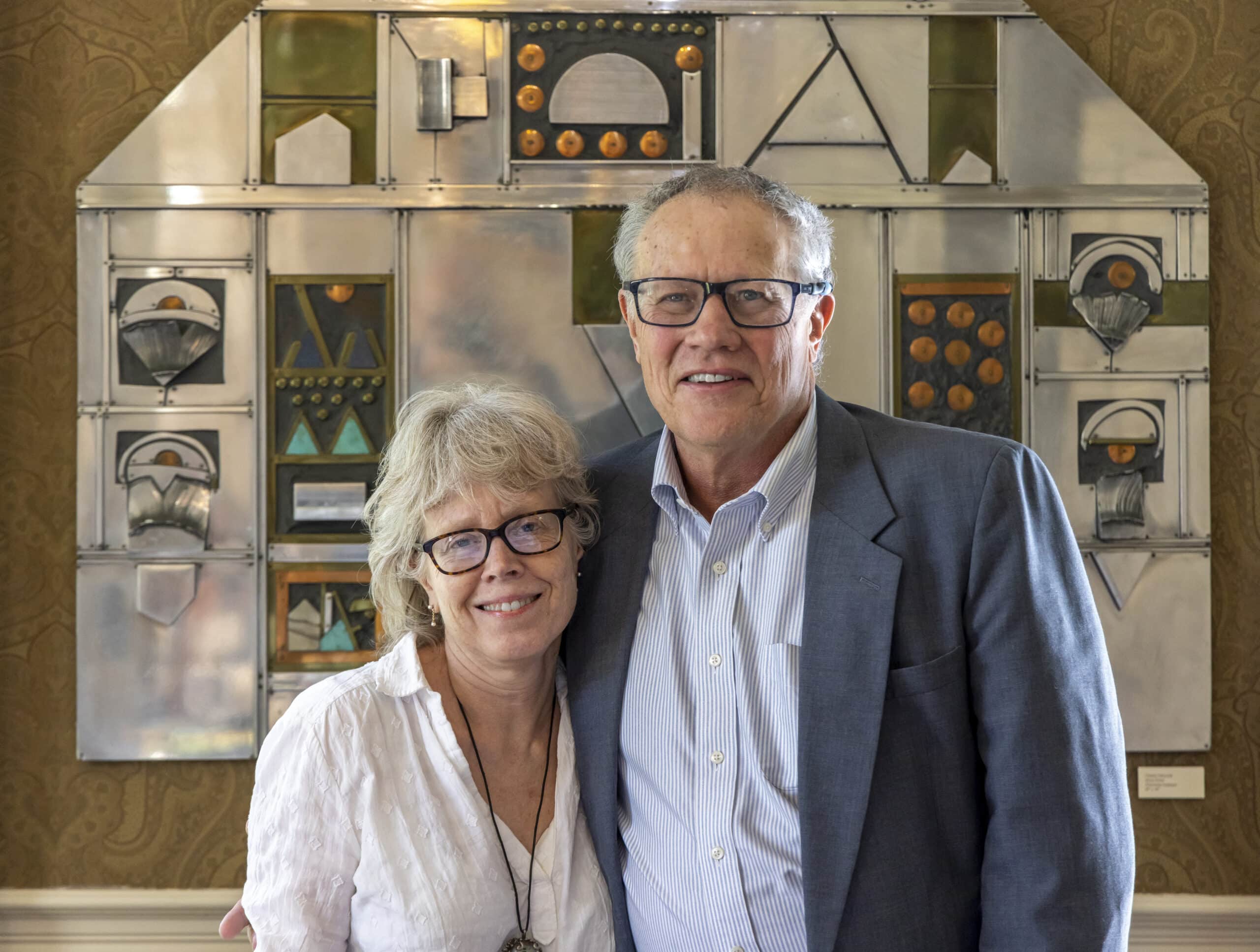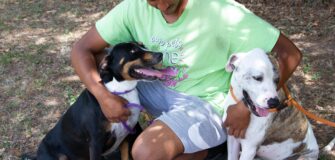
Grady Hillman is a poet, anthropologist, artist, urban planner, writer, teacher, and translator. It’s not so much he has separate careers; rather, he has found a way to roll these careers into one livelihood and one lifetime. His work has taken him around this country and to more than 20 other countries, to the betterment of diverse communities and populations. Over the past dozen years or so, he and wife Mandy Gardner have combined talents in these endeavors.
Where did you grow up, and how did this develop your facility with language?
All over: Mississippi; New Orleans, and other parts of Louisiana; Houston; Beaumont; Odessa; and Maracaibo, Venezuela. In New Orleans, French was required; in Venezuela, I had Spanish instruction; and in high school, I took German.
How did that turn into a career in poetry?
I was studying Humanities at Southern Methodist University, but I took a break from school and sort of did the hippie/activist thing; I became a carpenter. I moved to Austin where all the artists, writers, and dancers were banging nails as the city was beginning to grow. I would do poetry readings with construction buddies. But I was always interested in people, the stories they tell, and the things they believe in that help them make sense of the world. I ultimately graduated from the University of Texas and found understanding those things could benefit communities and earn me a living.
How did you wind up teaching in schools and in prisons?
It began when asked to be part of ‘Poets in the Schools’ in Huntsville. I did that, then Bob Pierce from Windham (Windham is the school district for TDCJ) contacted me about doing ‘Poets in the Schools’ in prison. This had never been done.
How did you and the program evolve?
I ended up teaching in more than 100 prisons! Some of that work was the subject of the award-winning film, Lions, Parakeets and Other Prisoners (1984); I also received a Texas Humanities Council grant to do Jailin’ in Texas, a discussion program about prison storytelling. That was especially gratifying.
How do people react when you tell them you taught in more than 100 prisons?
(chuckles) They might think it’s unusual or unsafe. If they ask, I just say, “It’s interesting, but not nearly as challenging as teaching a group of middle schoolers. Middle school is the toughest place I’ve ever worked.”
I taught in Beaumont, San Angelo, Terlingua, and other places. I taught in Mumford, a small town near Bryan, and I was in a classroom with children between the ages of five and nine, teaching them all at the same time. It required innovation, and it was a great learning experience for me, too.
What type of assignment would you give inmates at Windham?
I taught Dante’s Inferno, which has various characters from literature in various circles of Hell. They read the book, and I posed questions, one of which was to assess the punishments that Dante assigned to his characters. I’m not sure if they thought I’d be turning over their answers to the parole board, but they were all in favor of harsh punishments, noting, “Oh, Dante was too lenient. They deserve much worse!” Whatever the motivation of their responses, they knew the material.
At the end of the 1980s, you obtained a Fulbright Fellowship and returned for your Master’s Degree. What prompted that move?
I was dependent on other scholars throughout the 1980s to do the programs I wanted to do. I had the ability to implement the big grants, but I did not have the graduate degree, and in the Humanities, you really need such a degree. The Fulbright turned into my graduate research. I was able to travel and work with Dr. Roger deVeer Renwick, and I learned a lot about the Incan culture and language.
In fact, you took on the unlikely task of translating poetry from Quechua to English!
Yes, I had been to South America, and I was interested in the Incan Empire which, at its peak, was as large as the Roman Empire. The University of Texas taught Quechua, so I had this opportunity to learn. For the translation project, I worked with a professor named Guillermo Delgado, and he didn’t speak much English, and I didn’t speak much Quechua. Our common language was Spanish, and that’s how we worked, translating these Incan myths and poems to English.
Why did you choose anthropology for your Master’s degree, and how did your work change afterward?
It connected the things that interested me. It is studying people, and that’s what I do. I had more flexibility, and I could do larger projects. I put together cultural or historical plans for many communities: the King William District in San Antonio (TX), as well as districts in Greenwood (MS), San Marcos (TX), Charleston (MS), Anniston (AL), and the cultural district in Huntsville (TX).
When did you meet Mandy, and how did that change things?
We met briefly in 2007; I then reached out to her in 2010 for something work related, and something clicked.
It didn’t so much change things as enhance them. She has a PhD in interdisciplinary studies, with a focus on pedagogy, literature, and sociology. She has taught in jails and homeless shelters, and she is a writer, often writing about health. This was a match for me, and her knowledge turned out to be helpful. At the time, all I knew was: I was at the top of my professional game, and I had met a wonderful woman.
This wonderful life stopped—literally—on June 26, 2011. While walking his dog, Hillman had a heart attack, a cardiac arrest, and a stroke—a medical hat trick. A short ambulance ride and three defibrillations later, his heart resumed beating. His fine motor skills and his voice, however, were slow to follow. The poet had lost his voice.
What do you recall about the moment you awoke?
I don’t have clear memories of much immediately following the stroke. I remember trying to communicate, but it was just gibberish. I also lost memory of events before the stroke. I didn’t even remember Mandy. That was her best chance to leave me. I wouldn’t have even known! (much laughter)
Mandy Gardner didn’t leave. In fact, she was essential to his recovery. They married in 2012, about nine months after Grady’s stroke.
How long were you unable to speak?
About two months. I was in the hospital for a month, then I went into rehab for five or six weeks. Even after I went home, I struggled, doing things like reading the paper upside down (laughs).
Mandy Gardner: He mostly babbled, and he would agree to all sorts of things, because he didn’t have a sense of time.
Grady: It’s a linguistic joke: “I lost my tenses.”
Mandy: It’s worth noting here that his speech therapists used his poetry to help him recover.
Grady: Yes, they taught me through “key vocabulary.” My poetry contained words that had meaning to me, and it helped me relearn language and speech.
When were you able to work again?
About a year later, I had my memory and most of my skills back. We got a grant from the National Endowment for the Arts (NEA) to do research. Beth Bienvenu, the Director of the Office of Accessibility for the NEA, contacted me and asked me to mentor writers teaching in a federal prison program. She said, “You still have your memory and your cognition, and we can work around your ability to talk.” So, I worked on that project for several years, until COVID put an end to it and similar projects.
Is the memory fully back?
Names and numbers give me the most problems. At times I cannot think of the correct word, and I have to use a circumlocution to describe it. It’s a slow, long recovery from losing about half my vocabulary.
Mandy, Grady, and half his vocabulary now live in Albuquerque, and he still works and travels. He completed a book in the past year, Arts in Corrections: 30 Years of Annotated Publications by Grady Hillman.
It’s been a dozen years since the stroke, what ails you besides the vocabulary?
My right hand has lost some motor coordination, so it’s harder to write. Things come to me more slowly, which makes it difficult to toggle back and forth among topics. It’s like a large ship trying to turn around. I’m still recovering, and I’ve been humbled, but I am doing what I need to do. I am an editor, and I am editing myself, with the help of Mandy.
What are your current projects?
I am still publicizing the book, and I am working on a project to get back into a correctional facility to teach arts and poetry. I am also working on a book based on my travels in Peru. I wrote a lot of poetry when I was in Peru, which was during their civil war, and I kept journals.
Would it have been more difficult to recover from your stroke if you hadn’t been trained in linguistics and had so many diverse life and career experiences?
It would have. I was trained as a linguist and as an anthropologist. I know what’s wrong with my brain; I know what I am doing; I know where to go for help; and Mandy knows what I don’t. It is a blessing.

Postcards Magazine
936-293-1188
PO Box 690
Huntsville, TX 77342
